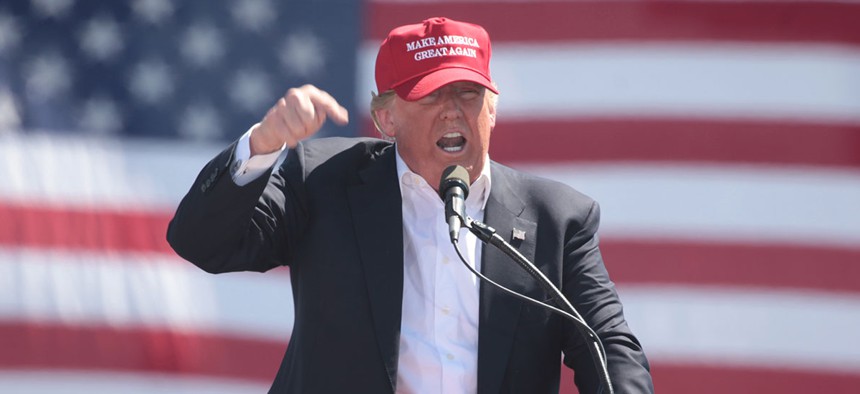
Flickr user Gage Skidmore
Trump Sticks With Tweets and Insults
As Clinton goes on the attack, his freestyle campaign lacks money, staff, and a consistent message
Republicans who have been eager for a new, less volatile, more presidential Donald Trump should probably settle in for a longer wait.
A full month after nailing down the GOP presidential nomination, the real-estate mogul’s campaign is still struggling to raise money, hire staff in key states, or even establish a serious communications shop to counter Democratic attacks.
“Every day that goes by is a day lost. That’s true,” conceded one Trump aide privately.
The candidate himself, meanwhile, continues to let personal grievances shape his campaign message. During a recent trip to New Mexico, Trump insulted the popular Republican governor, who happens to be female, Hispanic, and chair of the Republican Governor’s Association. Her major offense: At an April fundraising dinner in New York City for the state party, Susana Martinez tapped out messages on her smartphone instead of attentively listening to Trump’s speech. (Trump late this week started trying to make amends.)
And over the last week, Trump has been lashing out at a federal judge in San Diego, saying his Mexican heritage prevents him from fairly presiding over the class-action lawsuit filed by former students of Trump University, accusing it of fraud.
“Absolutely zero upside,” the aide said. “What the candidate is doing is risking our numbers.”
Trump is also continuing a campaign consisting largely of his own rallies and the attendant media coverage, rather than systematically focusing on major themes. While that strategy worked during the GOP primaries, in which he was able to win by drawing more voters to low-turnout contests, it’s unclear whether the tactic can work in a general election, which attracts millions more voters.
Among the consequences of this freestyle, low-budget approach has been Trump’s failure to assemble an experienced staff to promote his message and blunt that of likely Democratic nominee Hillary Clinton. While the Clinton campaign has nearly two dozen staffers in its press shop, Trump essentially relies on just two: campaign manager Corey Lewandowski and press secretary Hope Hicks. (Neither replied to a National Journalquery for this story.)
The contrast was on vivid display Thursday in California. Clinton delivered a long-prepared, much-rehearsed 34-minute speech that eviscerated Trump, calling him dangerously ill-suited to be commander in chief. “Donald Trump’s ideas aren’t just different. They are dangerously incoherent. They’re not even really ideas—just a series of bizarre rants, personal feuds, and outright lies,” she said.
The Trump campaign’s entire response: Trump sending out Tweets that Clinton didn’t “look” presidential and critiquing her TelePrompTer reading ability, and, later that evening, calling Clinton names and saying she belonged in jail. “Let me tell you. My temperament is so much tougher and so much better than her temperament,” he said.
Had the situation been reversed, the Clinton team likely would have flooded reporters with rebuttals and fact corrections, set up a conference call with top staff, and offered up surrogates to appear on the TV networks. This is exactly what the Trump aide had been pushing for, but Trump was confident he could handle the response himself. “This is going to be a constant challenge,” the aide said.
It was a challenge that was supposed to be going away. Longtime Washington lobbyist Paul Manafort, who was hired when Trump still feared a brokered convention, assured Republican National Committee members at their April meeting in Florida that Trump would acquire the trappings of a traditional campaign and start behaving in a more professional manner after he sewed up the nomination. It’s the same message that Manafort has been spreading to members of Congress in visits to Capitol Hill.
But Trump himself has resisted any such change. He has continued the belittling insults in speeches and on Twitter that he believes helped him win the nomination. At a confrontational news conference this week regarding his belated donations to veterans’ charities, Trump said he had no interest in a makeover. “You think I’m going to change? I’m not changing,” he said.
Underlying all the concerns is money, or as one Trump adviser described it on condition of anonymity, the lack thereof. Trump paid for most of his primary campaign out of his own pocket, spending $43.5 million by the end of April. But his financial disclosure documents show that despite repeated claims that he is worth more than $10 billion, he has nowhere near the cash and liquid assets he would need to finance a $1 billion general-election effort.
And while his campaign did sign a joint money-raising agreement with the RNC, so far that has resulted in a single fundraiser that reportedly brought in $6 million. “They need to be raising that every day,” the adviser said.
Clinton, meanwhile, has raised $239 million through the end of May, and has already started building general-election staffs in key swing states, including Florida, where a Clinton win would likely make a Trump presidency impossible.
Trump, in contrast, has little beyond the skeletal staff he had for the March primary in that state, said longtime Florida Republican consultant and Trump critic Rick Wilson. “They don’t have the money to pay them,” he said. “There’s no resources on the ground, there’s no organizing, they don’t believe in data.”
The Trump campaign aide, though, said that was changing, despite the difficulty of raising money for a self-described billionaire. New donors are coming on board weekly, both those ready to bundle $5,400 checks from their friends as well as those willing to write five- and six-figure checks to a newly created super PAC by a Trump loyalist.
“To write the epitaph of this campaign’s fundraising would be premature,” the aide said. “Give it two weeks.”
(Image via Flickr user Gage Skidmore)






